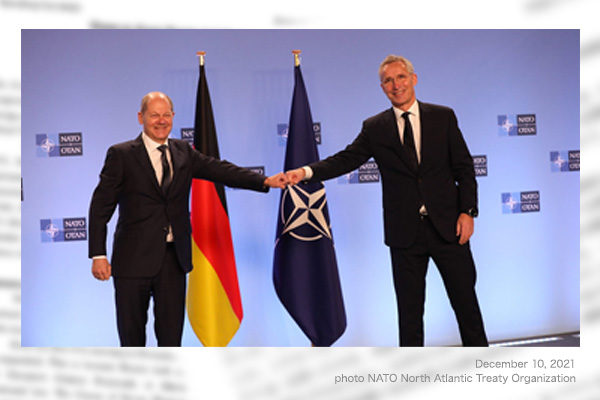“Germany is no longer a credible ally,” writes Tom Rogan, a foreign policy and national security writer for the conservative Washington Examiner magazine. “Germany often acts like a de facto ally of the Russians,” writes Ross Douthat, a columnist for the liberal New York Times, criticizing Germany as if it were a traitor to the North Atlantic Treaty Organization. On February 7, German Chancellor Olaf Scholz plans to hold talks with U.S. President Joe Biden at the White House. They are unlikely to successfully coordinate their approach to the Ukraine issue.
Hesitancy in shutting down gas pipeline
At a time when NATO countries are busy with preparing weapons and troops amid one of the most serious postwar tensions over Russia that has amassed more than 100,000 troops around Ukraine, Germany has refused to provide weapons to Ukraine. Furthermore, it has put a brake on Estonia’s plan to send old weapons from the former East Germany to Ukraine. Instead of weapons, Germany has offered to provide equipment and training of staff for field hospitals and 5,000 defense helmets to Ukraine. How significant are helmets for enhancing deterrence against Russia?
An undersea gas pipeline called Nord Stream 2 has just been completed between Germany and Russia via the Baltic Sea for transporting natural gas from Russia. For national security reasons, the United States has raised objection to the pipeline that makes Europe more dependent on Russia for energy supply. The danger of the pipeline has now become real. When the U.S. and its NATO allies impose sanctions on Russia’s potential invasion into Ukraine, the shutdown of Nord Stream 2 should become a key tool. But Scholz has not given a nod.
It is also unignorable that former Chancellor Angela Merkel who promoted the pipeline project also established special economic relations with China. More than 2,000 German companies have been in China, allowing machine tool and other German technologies to flow into the country. German began to pay attention to China’s crackdown on Uyghurs only in the closing days of the Merkel government.
Merkel’s predecessor Gerhard Schroeder served as a director at Nord Stream AG that operates the pipeline. Schroeder is also known for his efforts to realize China’s accession to the World Trade Organization in 2001 and work on the European Union to lift sanctions imposed on China after the Tiananmen Square massacre in 1989.
Look squarely to the Japan-Germany history
Japanese people tend to feel an affinity with Germany apparently because the two counties formed an alliance during World War II and were put in the status of defeated nations after the war. But we must coolly observe state-to-state relations. Far back in history, Germany, along with France and Russia, staged the so-called Triple Intervention to oppose Japan’s territorial ownership of the Liaodong Peninsula in China just after the first Japanese-Sino War in the late 19th century, leading Japan to experience the dark days of perseverance. In World War I, Japan declared war against Germany. In a shocking incident that triggered World War II, Adolf Hitler and Joseph Stalin formed an alliance by concluding the German-Soviet Nonaggression Pact, virtually nullifying the Japan-Germany anti-communist pact and forcing Japan’s then Kiichiro Hiranuma cabinet to resign. Be alert to German moves.
Tadae Takubo is Vice President, Japan Institute for National Fundamentals, and a professor emeritus at Kyorin University.


